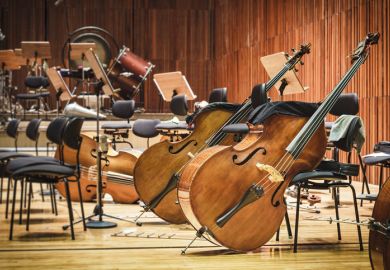Who is Zemlinsky?" The questioner was the former editor of one of our leading quality newspapers; the occasion one of these endless public controversies deploring the BBC's tendency to broadcast impossibly obscure composers. Perhaps he should have known. Musically literate people could have told him at least three things about Zemlinsky. Schoenberg had lessons with him; then married his sister. He was the dedicatee of Berg's Lyric Suite, which also has a quotation from Zemlinsky's Lyric Symphony in it. That was about the size of it until, more than 30 years ago now, the Zemlinsky revival got under way: a scholars' matter first, then, gingerly, some of the operas got re-staged and some of his music began to reappear in concert programmes.
Now comes the first full-length biography in English, written by Antony Beaumont, who has already published a biography of Busoni and edited the diaries of Alma Mahler-Werfel. It does not quite dispel all the mists round the life of a man for whom documentation remains scarce and who anyway seems to have lived most naturally in the shadow of others. Both Fame and Notoriety are the most fickle of goddesses: there is always one who gets left out, even forgotten - the early Beatle, the missing Marx Brother. It was not quite like that with Zemlinsky and the Viennese Three - Schoenberg, Berg and Webern. It was more that both his life and his music simply took a different turn from the others. Composers' reputations take some time to build up, and are not infrequently posthumous. Those of conductors are more immediate, but (certainly in the pre-recording era) are often ephemeral.
By all accounts, Alexander Zemlinsky was an excellent and distinguished conductor, his chosen arena the opera house. In Habsburg Vienna he worked at the Carltheater and the Volksoper before putting in a season at the Hofoper during Mahler's last year. In 1911 he moved to Prague as conductor of the Deutsches Landestheater and stayed on under the new Czechoslovak Republic until 19. Then he went to Berlin to work under Klemperer at the Krolloper until it was closed in 1931. Thus, in these three capital cities he found himself at three nodal points of the Modern Movement in Central Europe.
A vast and varied repertoire came to life under his hands. At the centre was the core of German/Austrian classics that you would expect - Mozart, Wagner and Fidelio - and so forward to Richard Strauss. But there was also not only Bizet's Carmen and his much less well-known Djamileh. In 1908, Zemlinsky had given the Viennese premiere of Dukas's Ariane et Barbe-bleue: in 1924 at Prague, he was to give the world premiere of Schoenberg's fiendishly difficult Erwartung: in 1930 he was to introduce a Berlin audience to Jan cyek's Glagolitic Mass. His performances drew praise from unlikely quarters. Stravinsky has written that it was a performance of Der Frieschutz that first made him appreciate Weber; and "I was never inspired by a Mozart performance untilI I heard Alexander von Zemlinsky conduct Figaro in Prague". Beaumont offers a similar quotation to this one: but on the whole he does not quite convey the full stature as well as the versatility of Zemlinsky as a conductor.
Nor does he really throw much more light on those lessons that Zemlinsky gave Schoenberg. Maybe it is too late to find out: enough to know that they laid the basis of a deep friendship and for the young Schoenberg an abiding trust in the older man's judgement. On the occasion of Zemlinsky's 50th birthday, Schoenberg was to say: "He has remained the man whose attitude I try to imagine when I need advice."
The other two Viennese were equally close. We think of Webern as somewhat austere; but he had an emotional, indeed sentimental streak, and this evidences itself in enthusiastic letters about Zemlinsky's Maeterlinck songs (and other songs too). "My God, how beautiful it all is," he writes, and again, "I was in a continual state of ecstasy." Berg too was to be very much under the spell. He wrote admiringly about the Lyric Symphony. He also wrote critically to his wife, Helene, about the first production of Der Zwerg; but he extols "the unendingly sweet, surging melody".
It seems to us now that the compositional ways of the four had long since parted. Zemlinsky - like so many others - could follow Schoenberg up to the Chamber Symphony of 1906: and this was to be the last work to leave definite traces on his style. But then Zemlinsky was marching to the sound of a different drum: he was first and foremost a professional opera composer in a way that the others simply were not: his main preoccupation was to seek and to develop a musical style that worked in the theatre. His range of subject matter was wide: fairy tale, mythology, two dark and passionate stories from Oscar Wilde, and a popular play with a Chinese setting, whose treatment brought him close to the Neue Sachlichkeit of the time. He had been swept up in the general European passion for Rabindranath Tagore, and their temperaments seem to have had an affinity: Zemlinsky took seven poems from The Gardener for his Lyric Symphony of 1922-23. Later he was to draw on the "Harlem Renaissance" of black American writers for his Symphonic Songs op. 20 of 1929.
A not particularly sympathetic portrait of the man emerges. He obviously very soon learned how to use his physical ugliness and short stature to erotic advantage, and in his youth prided himself on his conquests as a miniature roue. These did not quite include the poisonous Alma Schindler, later Mahler, already at 19 instinctively knowing how to give men a hard time. (The friendship, surprisingly, lasted.) Like many men successful with the ladies, neither of his two marriages was particularly happy or fulfilling. He was a loser, not blessed with luck. Whether it was a cut dinner engagement or a cancelled opera production, he maladroitly went on his way.
Beaumont's writing is serviceable rather than elegant, efficient rather than perceptively intuitive. But the book will be useful for all those who want an answer to the question "Who is Zemlinsky?".
Hugh Wood is a composer and was formerly lecturer in music, University of Cambridge.
Zemlinsky
Author - Antony Beaumont
ISBN - 0 571 16983 X
Publisher - Faber
Price - £30.00
Pages - 524
Register to continue
Why register?
- Registration is free and only takes a moment
- Once registered, you can read 3 articles a month
- Sign up for our newsletter
Subscribe
Or subscribe for unlimited access to:
- Unlimited access to news, views, insights & reviews
- Digital editions
- Digital access to THE’s university and college rankings analysis
Already registered or a current subscriber?



